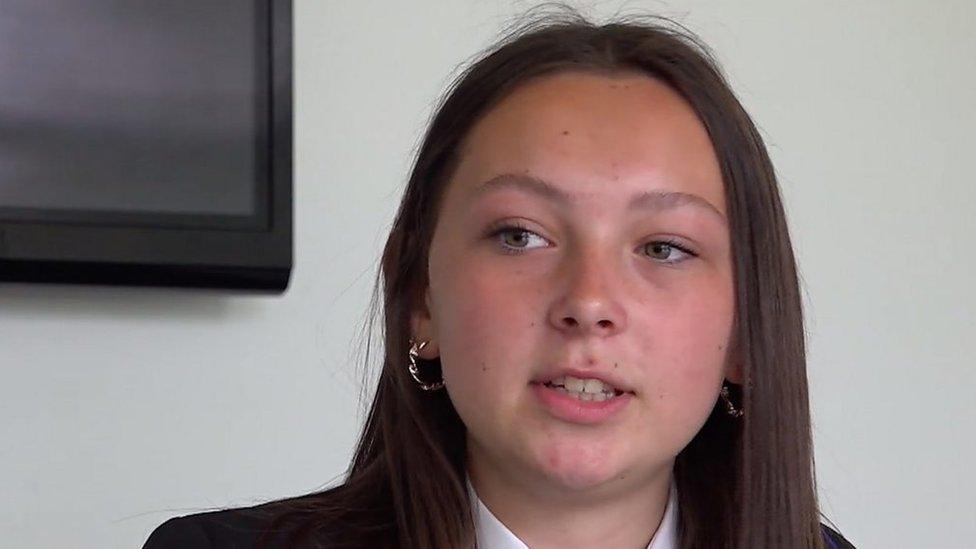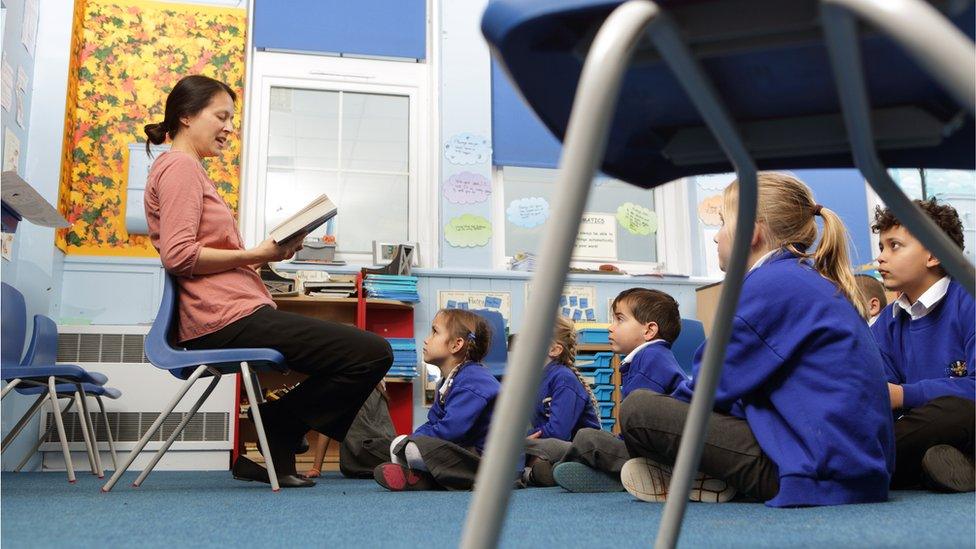Schools: Caution urged on fines for children's absences
- Published
'Getting back into the school routine was difficult'
Fines for parents of children who miss school should be used with caution, the children's commissioner has said.
Rocio Cifuentes said it had been a difficult time due to Covid and some children would need support going back.
Education Minister Jeremy Miles said fixed penalty notices could be issued in "the most extreme cases" after they were discouraged when the pandemic hit.
It comes as part of a "step up" in messaging about the importance of going to school amid concern over absences.
One head teacher said children needed to be in school to "achieve, do well and be supported".
At Mary Immaculate High School in Cardiff, the attendance at the moment is about 90% - in line with the Welsh average.

Huw Powell says there is a "real tangible impact" when children miss school
While some absences were still directly due to Covid, and another small number were persistent absences, the school has seen an increase in children not attending for "occasional days", sometimes Mondays and Fridays, which build up throughout the school year.
"There is a real tangible impact when children aren't here," head teacher Huw Powell said.
"We want all the youngsters here because the ability to access the curriculum, the ability to be involved in teaching and learning and the ability to access the pastoral support and in some cases the mental health support is dependent on them being here in school."
Across Wales, attendance for the most recent week, the week commencing 3-6 May, was 89.3%, and it has consistently dipped below 90% in recent months.
It compares with average attendance of about 94% before the pandemic.

Pupils Joel and Belle have been adapting to life back at school full time
Deputy head teacher Annmarie Wilson is in charge of pastoral care in the school and said some pupils' mental health had suffered over the past two years, affecting their attendance.
"I think we have seen an increase in those pupils who are feeling more anxious about coming to school," she said.
"Children and families had gone into routine when they've been out of school.
"Coming out of that routine and then knowing that they need to be coming into school has been a particular barrier for some of them."
The school has three attendance officers who build relationships with families to ensure children go to school.

Katie Lambert works with parents to ensure pupils are in class
Katie Lambert sees her role as a "line of communication" between the school and home.
She said there were different factors contributing some pupils' non-attendance, with a small amount directly linked to Covid.
"Some families have lost jobs, there's been bereavements, the list could go on and on and it's just about the school providing the right support for each individual," she added.
Year 9 pupils Belle and Joel enjoy being in school but said readjusting after long periods at home was a challenge for everyone.
Belle, 14, said it had initially been "overwhelming" and that "changing my sleep schedule, waking up earlier to get to school" had been a challenge.
"It's good getting into a routine - you should be in a routine for school," she added.
'Difficult time'
Joel, 13, said going back to school last year was "a bit rocky", having to get ready quicker in the mornings.
"School is somewhere for me to meet up with my friends and learn something new and experience new things so I've really enjoyed being back."
Ms Cifuentes said missing education affects children's academic progress, mental health and emotional wellbeing.
"It's been a really difficult time for children and families and some will need support to feel confident and happy in going back to school," she said.
Ministers have encouraged councils not to issue fines for truancy during the pandemic, but due to concerns over absences councils are returning to the advice that was in place before the pandemic.
"Fines have to be used with care because there is a risk punitive measures could push families away and drive de-registration," said Ms Cifuentes.
A recent report for the Welsh government said there were mixed views on the effectiveness of fines and called for a further review of the evidence.
Mr Powell said fining parents was "a very rare occurrence" and "very much the last resort for any school".
But he said they were useful to reinforce "a message that schooling is important".
A spokesperson for Plaid Cymru said: "During the present cost of living crisis where parents are already struggling to make ends meet, imposing fines on parents who take their children on holiday during term time, and on parents who cannot get their children to go to school, for whatever reason, is absolutely unjust, and could potentially counteract some of the support measures designed to respond to the crisis."

BORN DEAF, RAISED HEARING: Jonny Cotsen explores what it means to live in two different worlds
MARGINS TO MAINSTREAM: Michael Sheen introduces new writers revealing their truths

Related topics
- Published16 May 2022

- Published3 May 2022

- Published29 April 2022
